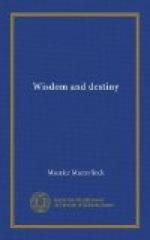6. “It was doubtless the will of their destiny that men and events should oppress them whithersoever they went,” said an author of the heroes of his book. Thus it is with the majority of men; Indeed, with all those who have not yet learned to distinguish between exterior and moral destiny. They are like a little bewildered stream that I chanced to espy one evening as I stood on the hillside. I beheld it far down in the valley, staggering, struggling, climbing, falling: blindly groping its way to the great lake that slumbered, the other side of the forest, in the peace of the dawn. Here it was a block of basalt that forced the streamlet to wind round and about four times; there, the roots of a hoary tree; further on still, the mere recollection of an obstacle now gone for ever thrust it back to its source, bubbling in impotent fury, divided for all time from its goal and its gladness. But, in another direction, at right angles almost to the distraught, unhappy, useless stream, a force superior to the force of instinct had traced a long, greenish canal, calm, peaceful, deliberate; that flowed steadily across the country, across the crumbling stones, across the obedient forest, on its clear and unerring, unhurrying way from its distant source on the horizon to the same tranquil, shining lake. And I had at my feet before me the image of the two great destinies offered to man.
7. Side by side with those whom men and events oppress, there are others who have within them some kind of inner force, which has its will not only with men, but even with the events that surround them. Of this force they are fully aware, and indeed it is nothing more than a knowledge of self that has far overstepped the ordinary limits of consciousness.




